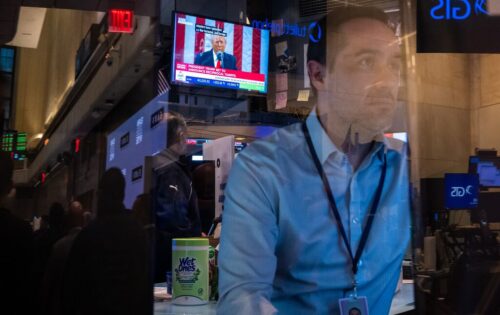While stock market turmoil has grabbed headlines amid the new tariff confusion, the multi-trillion dollar US bond market has also been hit by a sharp downturn this week. And the bond market’s potential for slowing economic activity could be even more dire.
After Trump’s tariff announcement last week, stock markets immediately tumbled on fears of higher prices and slowing business growth. But initially the bond market performed well, as it often does in times of financial stress.
How worried should you be about the stock market? Here are three things to consider. | Analysis
On Thursday and Friday, the price of the 10-year Treasury note, a key benchmark for setting borrowing rates, rallied. When bond prices rise, yields decline, ultimately making it cheaper to borrow money for mortgages, car loans, and business expansion. That means the bond market has much more direct impact on the economy than the stock market.
The two investments, which make up the bulk of most people’s personal and retirement accounts, often move in different directions.
A red hot economy is good for stocks but can spark inflation, which is bad for bonds. When the economy slows, stocks lose momentum but bonds usually do better. However, when both markets sink at the same time, that can be a sign of extreme stress in the financial system.
At the end of last week, the up and down tariffs and Trump’s confusing policies were seen as a drag on the economy. While stocks fell, bonds followed the common pattern and gained. The yield on the 10-year fell from about 4.20 percent to just under 4 percent.
But this week, amid growing fear that the tariff plan won’t be quickly negotiated away, bonds prices tanked and the yield on the 10-year rose above 4.50 percent.
Trump administration officials had pointed to the bond market’s strength in the early going as a reason to support the tariff plan.
“I view myself as the United States’ leading bond salesman,” Treasury Secretary Scott Bessent said over the weekend. The “ten-year interest rate…is probably the most important rate in the country, since mortgages and capital formation are based on it.”
This week, as the tariffs took effect and other countries started to retaliate, the bond market nose dived even as stocks continued to weaken. The yield on the 10-year rose by more than half of one percentage point, an eye-watering increase in just two days.
Should you buy a car right now? Will 401(k)s ever recover? We answer your tariff questions.
The gyrations reflected the tremendous uncertainty about what Trump might do next combined with the complexity of forecasting how the tariff shock will play out in the economy if left in place.
So one explanation for the bond market turmoil could be that last week, investors were hoping Trump would negotiate deals to lower the tariffs, reducing the risk of inflation though likely also slowing the economy through uncertainty and confusion. “Investors expect elevated tariffs to be walked back relatively quickly,” analysts at Wall Street firm UBS wrote on Friday, trying to explain the initial bond market rally.
But over the weekend, that view shifted as Trump insisted he would keep the tariffs in place and other countries announced retaliatory measures on US exports.
“Investors today are coming to the scary realization this economic Armageddon Trump tariff policy is really going to be implemented this week,” Wedbush analyst Dan Ives wrote in a report on Monday.
Maintaining the vast menu of tariffs heightened the risk that inflation will take off, which hurts bond prices. The risk of higher inflation also makes it more difficult for the Federal Reserve to cut its benchmark interest rate, removing another support for the bond market and helping spark the selloff.
Some market participants offered a more technical rationale for the chaos this week that related to the actions of the most aggressive investors in the market, such as hedge funds.
Many funds owned Treasury bonds to back loans that fueled their trades in stocks, futures, and other markets. With the stock market tanking, the funds had to reduce their risky bets and sold their Treasury bonds to pay back the loans.
If that is the case, the bond market could quickly stabilize once the wave of hedge fund selling ends. If not, the markets could continue to tumble.
As Trump doubles down on Chinese tariffs, this Framingham shoe company has nowhere to run‘Don’t want to overreact’: Tariff rollout, stock market rout put small New England businesses in a bindHow much will car prices go up with tariffs? New England buyers aren’t waiting to find out.




Comment count: